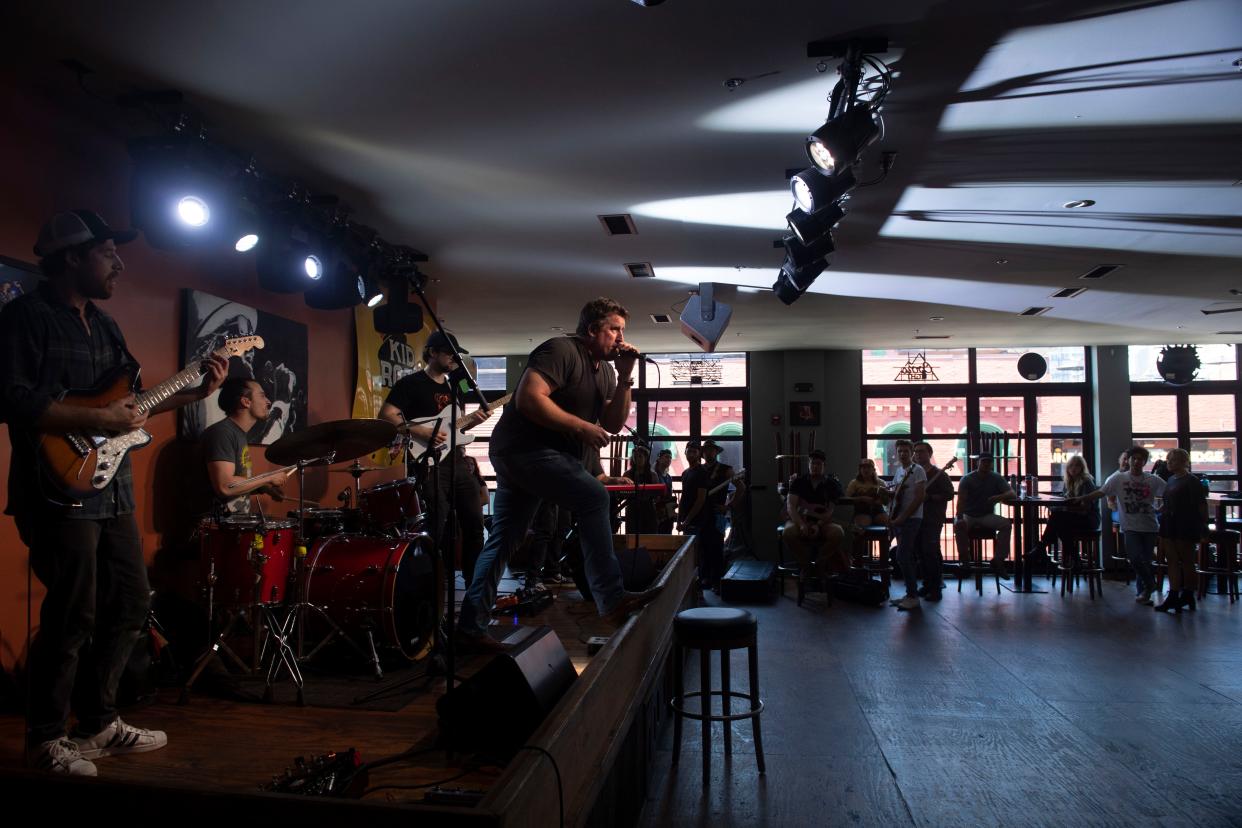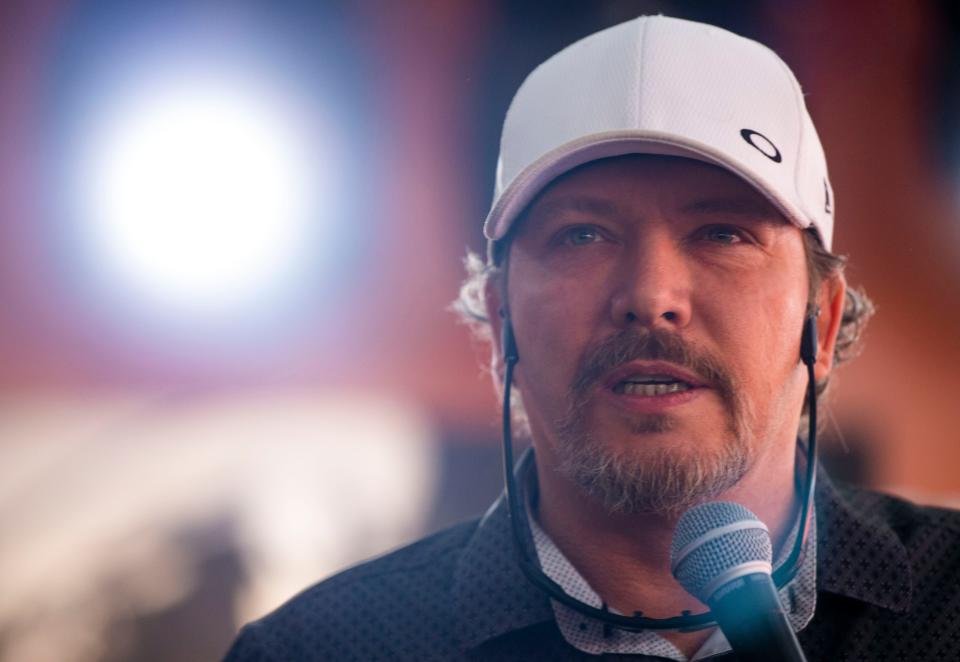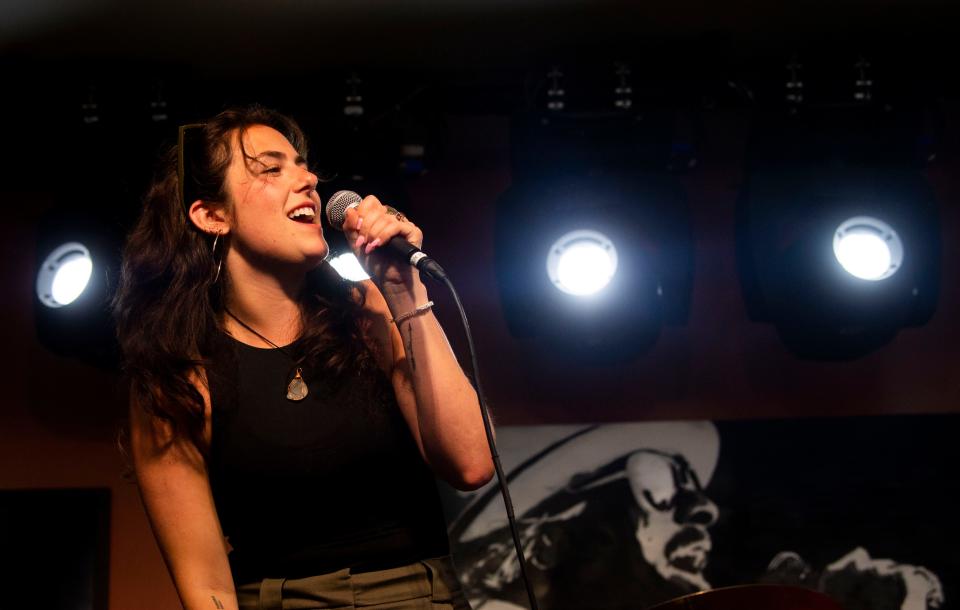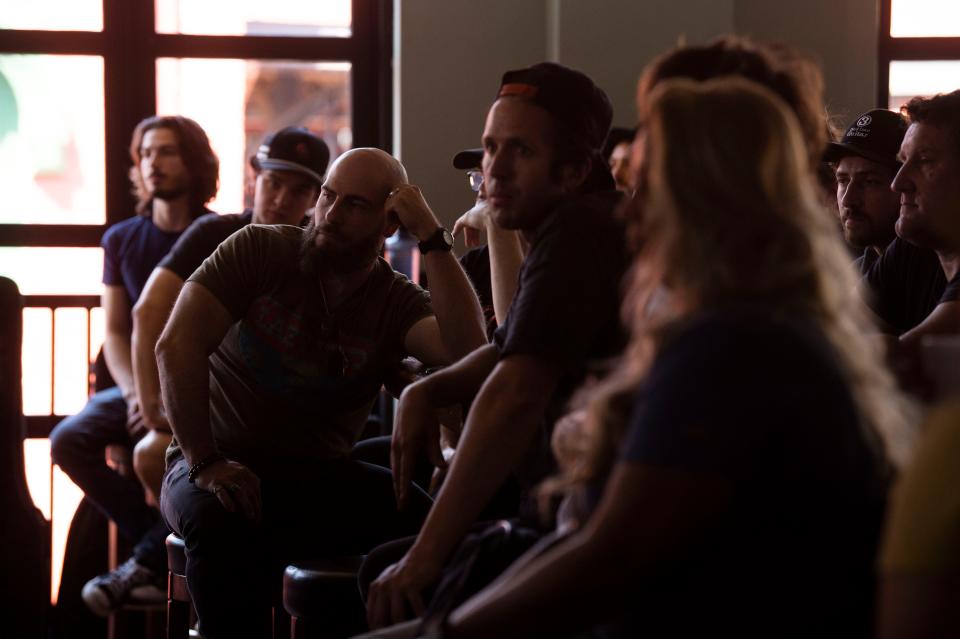'A money making machine': Is Nashville's iconic Lower Broadway losing its music soul?

Scott Collier had some advice for the young Texan standing on stage with the guitar.
It was a little before 11 a.m. on a Monday morning in July and the third floor of Kid Rock's Big Ass Honky Tonk Rock N' Roll Steakhouse in Nashville, Tennessee, was quiet.
“You got some pretty eyes,” said Collier, a longtime Lower Broadway frontman and guitar player. “People like to see your eyes. You got to connect with your audience, but it's hard to connect whenever you’re so focused and have your eyes squinting like that.”
The young man with the pretty eyes was Solon Holt, who moments ago had closed his eyes in concentration while singing “Tennessee Whiskey" to harness the full power of a voice that sounded much older and wiser than its 19-year-old owner.
Holt and his band’s audience weren’t bar patrons, but fellow musicians sitting and standing amid bar stools flipped upside down on high tops, anxiously awaiting their turn on stage to be critiqued. Or maybe to get a gig.
At a front table facing the stage, sitting in a line of three like "American Idol" judges, were the teachers, so to speak, of Honky Tonk School. One of them was Collier.
Collier told Holt and his band they sounded great. But he reminded them that success on Lower Broadway is about more than just sound.
“You got to be an entertainer,” he said. “You need to watch a bunch of Elvis Presley. Even if you don’t like him, watch him. Learn from him. Pull up some Kid Rock videos, dude. Watch him.”
For the next song, Collier said he wanted to see some movement and connection.
Honky Tonk School is a sort of informal development program and support community for the musicians who play, and want to play, in Steve Smith’s empire of Lower Broadway bars, the crown jewel of which is the legendary Tootsie’s Orchid Lounge. The “Tootsie’s Circuit,” as its called, also includes Rippy’s, Honky Tonk Central, and Kid Rock’s.
The Tootsie’s Circuit and the rest of the rapidly expanding Lower Broadway bar scene draw millions of tourists each year. But it’s not the overpriced beers that bring those tourists downtown. It’s the music. And as more honky-tonks open on Lower Broadway, more musicians are needed to keep Nashville's most famous party going.
The Tootsie’s Circuit alone books 400 shows a week across all its various venues and stages, Collier said. In order to meet that demand, Collier and his colleagues have developed a stable of 84 bands and roughly 40 acoustic acts that they can trust to provide the kind of shows that keep the crowd engaged and the booze flowing.
Building that kind of roster requires a sort of development pipeline, almost like a baseball farm system. That’s why Smith’s older brother John Taylor created “Honky Tonk School." The school starts with auditions in front of paying customers on the second floor of Tootsie’s at 2 p.m. every Saturday. Those who pass that test are invited to the Monday morning sessions at Kid Rock’s, where the coaching begins.

“We've trained them from A to Z,” Taylor said. “We tell them which songs to sing, what to do, and how to do it.”
No one pays upfront to go to Honky Tonk School, but musicians who come from the school are expected to pay 10% of their base pay back to Tootsie’s as a booking fee. (Base pay is what the venue pays the musicians, which is generally dwarfed by the money made from tips).
Taylor's goal is to make sure he has plenty of bands to play his stages, but also to help the acts who come through his system reach their potential, he said.
“We're trying to see to it that they make a decent living,” Taylor said.
He estimated 80% to 90% of the performers on Lower Broadway have gone through Honky Tonk School at one point or another.
Whether that number is accurate or not, it speaks to the influence Taylor and his operation have had on Lower Broadway. And while some members of the Honky Tonk School community speak glowingly about the lessons and opportunities they've been given, others see an assembly line for the type of generic party music they believe has slowly sapped Nashville of its musical tradition.
“It's one of the few places downtown that kind of just gives everyone a shot,” said Sasha McVeigh, who played for Taylor at Tootsie’s when she first started coming to Nashville from her native England in 2012 and again when she moved permanently to Nashville in 2017.
But McVeigh eventually left the Tootsie's Circuit gigs at Redneck Riviera. She also is an administrator for the largest private Facebook groups for downtown musicians. There are “endless discussions” about the Tootsie’s Circuit there in those groups, McVeigh said.
“It's not gonna make you a star,” she said of the Tootsie’s system. “It's just a bunch of crap.”
Tootsie’s Orchid Lounge is where Hank Williams, Waylon Jennings, Willie Nelson, Kris Kristofferson and Patsy Cline drank and played. But a visitor today is more likely to hear covers of AC/DC or The Killers than the songs recorded by people that made the place an institution. And like most of Lower Broadway, it’s unusual to hear anybody playing an original song, or even a unique cover.
But at the same time, musicians are making more than ever performing Lower Broadway. Many are now making comfortable livings.
“It’s a machine, just a money-making machine,” said Chuck Mead, one of the founders of BR549, the band that reinvigorated Lower Broadway in the early 1990s. “But in the course of all that, it's lost a little something, it’s lost that originality.”
Back at the honky-tonk named after Kid Rock, a performer who became famous as a rapper, Collier told Holt and the band he wanted to see more movement and connection with the audience.
Holt looked at his band. Then they began to play.
'Playing Lower Broadway for a job'
About 15 million people visited Nashville last year and many of them took in Lower Broadway to see the city's musicians play. And to be sure, despite the criticism of a loss of originality, the music played on Lower Broadway is wildly popular for millions of visitors, and certainly more popular than before it became a mecca for pop and rock-fueled partying.
The music starts at dozens of bars around 11 a.m. and continues into the night and early morning hours, often across multiple stages and floors in the same establishment. That kind of sheer volume of live music requires a thousand or more musicians capable of not only playing at a professional level, but possessing the stamina to play three or four-hour shifts. Some musicians play multiple shifts a day.
On Lower Broadway, there are two ways to make money: base pay and tips. While base pay can range from $40 to $200 per gig for each band member, the real money is in tips. (Some Lower Broadway musicians are fond of saying that base pay only covers the cost of parking and gas for a gig).
The venues that tend to have the higher base pay also tend to discourage artists from aggressively soliciting tips. Most places still have a bucket that gets passed around, but now tips come in through Venmo as well, often attached to a request. Some songs cost more than others: "Free Bird," for example, often costs $100.
The divide between base pay and tips raises questions about how much venues should share revenues with the acts that their customers are there to see and hear.
“Obviously, the clubs are making money,” said Dave Pomeroy, president of the Nashville Musicians Association. “But base pay in these clubs has always been problematic. It’s very, very low. Some clubs are better than others.”
And in a city that attracts some of the best musicians from across the country, the number of musicians has historically greatly outnumbered the number of available gigs, making negotiating higher pay virtually impossible.
But some musicians see the recent expansion of venues and stages as an opportunity to shift the balance of power.
"It's the only time that I know of that the pendulum has actually swung in the musician's favor," said John Stone, a singer and guitarist billed as the "King of Lower Broadway." Stone performed at Tootsie's for 16 years before moving to Kid Rock's. "The musicians, if they realized it, actually have the power over the bars, because there are more stages and more slots to fill than there are actual, really, really good musicians to fill them with."
But if they are mostly living on tips, the increased foot traffic on Lower Broadway in recent years has meant more pay than ever before.
"There has never been a better time in the history of Nashville to be a working musician," Stone said. "They've never made this kind of money."
Many performers said there is simply no place else like Lower Broadway for working musicians who want to sleep in their own beds at night.
“You can make $100,000 a year,” said Nashville drummer Ross Webb, who has played with Kip Moore and Frankie Ballard. “You come around with the tip bucket once an hour and in four hours you can make $1,000 to $1,500.”
Of course, all of this is a fairly recent development. John England has witnessed the change from the stage of Robert’s Western World, where he and his band, the Western Swingers, have been playing every Monday night since 2001.
England is appreciative of Lower Broadway’s new popularity. He’s been supporting himself by playing his brand of Western swing music on Broadway for more than 20 years. That has been easier in recent years, as the money has grown with the crowds.
“What I do think is different is now it is possible to make a living doing it,” England said. “A lot of people are playing Lower Broadway for a job.”
But while the performers are more professional (it was far more common to see people drunk on stage in the old days, England said) they are also less unique.
“I think in the old days, people were more true to their own artistic identity. And that, to me, was more interesting because you go see this band and then you go to the place next door, and it's different,” England said. “It's not just like some generic thing where everybody plays ‘Mr. Brightside’ and ‘‘Brown Eyed Girl’ or whatever.”
England is glad musicians are making more money on Broadway. But he sounds wistful about the music that’s been lost.
“I guess you can’t have one without the other,” England said.
'Take every gig you can, learn every song you can'

At the start of Honky Tonk School at Kid Rock’s, Collier took the microphone, stood in front of the stage and painted a picture of the kind of life the gathered musicians could have on the Tootsie’s Circuit.
He started by telling them about his Saturday night spent in this very room partying with Kid Rock, Travis Tritt and alternative rock band Lit.
“And it was lit,” Collier joked. “What a great life we have. I get up every morning and pinch myself.”
He also made it clear who he credited for his good fortune: his bosses, Tootsie’s owner Smith, who he called “The Honky Tonk Godfather,” and Taylor. According to Collier’s telling, Smith and Taylor are responsible for turning the crime and prostitution-ridden Lower Broadway of the early 1990s into the international tourist destination it is today.
“They rebuilt this city,” Collier said.
Of course, the truth is not so simple. Collier didn’t mention that Ruble Sanderson, who opened several other honky-tonks downtown, was Smith’s partner at Tootsie’s, or that Robert Moore was also a part owner who later opened Robert’s Western World (originally called Three Doors Down because it was three doors down from Tootsie’s). Nor did he mention the opening of Bridgestone Arena just a few hundred feet from Tootsie's entrance in 1996. Or the band BR459 that drew huge crowds and record executives to Robert’s in the mid-1990s.
But Collier is an entertainer. Before a single act stepped on stage he delivered a 45-minute monologue that was part history of Nashville, part confessional and part TED talk on honky-tonk performing. He gave advice: Never use a stage name on tax documents, take care of your hygiene before every show, don’t be drunk onstage, script out your set lists, don’t ask for tips too frequently and don’t set a price on requests — you never know who will tip you $1,500 for a song.
He also told them to stay in Nashville and keep playing and learning.
"Take every gig you can, learn every song you can," Collier said. "Go down and watch these bands like John Stone and take notes."
Watching "The King of Lower Broadway" perform was the original "Honky Tonk School," Stone said. He started playing Tootsie's in 2003 and his performances were soon filling the venue on traditionally slow weekday nights, he said. Taylor began sending young musicians to take notes on Stone and his performance.
Stone is quick to point out that he isn't the best singer, guitarist or songwriter. But he knows how to put on a show. And he is committed to a very simple formula, which he believes is the key to success on Lower Broadway: play songs people know and can sing along with.
"Every song you hear me play was a smash hit," Stone said. By sticking to that strategy, he has "turned that tip bucket into a business," he said.
Pearl Clarkin has been singing at Tootsie’s off and on since she auditioned at the weekly tryouts when she was just 14, she said. Now 26, the 2020 Miss Rutherford County is supporting herself through her MBA program by playing four, four-hour sets a week on the Tootsie’s Circuit.
She’s also pursuing a career outside of Lower Broadway and working on an album. But she credits Taylor, Collier and others for allowing her to get thousands of hours of stage time.
“When you're in their system, you’re family and you’re always family,” Clarkin said. “They’re my bosses, but it also feels like they raised me because I was so young when I started.”
Zach Gilbert is one of the few musicians who plays saxophone on Lower Broadway. He also plays keyboard, percussion and harmonica. But like many young musicians who move to Nashville looking for a place to play, he quickly heard about Tootsie’s weekly auditions and played there in February 2022. Collier soon put him in a band and 18 months later he makes his living playing four shows a week.
In that short time, he’s seen acts come and go.
“Honky Tonk School is an opportunity,” Gilbert said. “It is up to you to work for the opportunity and to be selfless enough to confront what you do wrong and selfish enough to do what you're good at to the point of excellence.”
Nuance in the neon: Nashville has so many honky-tonks, but which is the right one for you?
'To one of the last honky-tonks left in this town'

Downtown musicians who spoke to The Tennessean seem to agree: two honky-tonks still maintain the traditional Lower Broadway spirit, where old country songs get covered in a variety of ways and performers are free to work in originals. Those are Robert’s Western World and Layla’s Honky Tonk.
On a Wednesday night at Layla’s in July, David Graham and the Eskimo Brothers tore through an impressive set that included virtuoustic electric guitar playing and a standup bass guitar played behind the head.
Graham and his bandmates covered Merle Haggard, Waylon Jennings, Charley Pride and Elvis, but in a rockabilly style. They also worked in originals that managed to raise the energy in the room, prompting sing alongs despite the lack of familiarity.
'Not a small problem': New research highlights country's crossroads with female artists
Not once did Graham or his bandmates look at their phones for lyrics while singing, which is a common sight on Lower Broadway. They did, however, abruptly stop a song to stare at a woman looking at her phone near the stage, prompting laughter from the crowd.
It was a very different scene than what was happening in nearly every other bar up and down the street.
Graham understood this, thanking his audience for coming “to one of the last honky-tonks left in this town.” At a time when there are more bars on Lower Broadway than ever before, the crowd, mostly middle-aged or older, cheered, seeming to know exactly what he meant.
In an interview, Graham said he plays Broadway a few days a week, but also tours. There was a time after moving to Nashville in 2006 when Graham sometimes played 10 or more four-hour shifts per week. Now that his touring schedule has picked up, he plays just three shows per week. But Graham credits Lower Broadway, and the tourists who saw him here and continued to follow him when they returned home, for that success.
“It's allowed me to build a very comfortable, independent career,” Graham said. “I can go to any city in this country and have an audience there, which is pretty cool. I've done that with Lower Broadway.”
But while Graham still professes his love for the street that helped make him, he can’t help but bemoan what it has become.
“I hate to say it, but the talent level is currently in a nosedive,” Graham said. “I hear from tourists all the time about how the music isn't as good as it used to be. And European tourists come up all the time, their first time to Nashville and they say ‘This is Nashville?’”
“It’s still a very special place,” Graham said. “But it has turned into a kind of a monster.”
At Kid Rock’s, after Collier asked Holt and his band for more movement and connection, they jumped into a blistering, up-tempo take on George Strait’s “The Fireman.” Holt seemed to be staring down every member of the audience while swinging his guitar side to side while he played. He was connecting and moving.
Are tiki bars offensive?: How Hawaiian bartenders are reclaiming the mai tai.
After he finished to applause, Collier wanted to hear another. He asked if they had any original songs. “No sir, none that we’ve prepared,” Holt said.
They then played the same soulful version of “Fire Away” they had played at Tootsie’s, their second Chris Stapleton song of the morning.
When they finished and the gathered musicians stopped applauding, Collier picked up his mic.
“Thank you, brother,” he said. “I got a good feeling about you.”
This article originally appeared on Nashville Tennessean: Lower Broadway: Is Nashville's iconic street losing its music soul?


